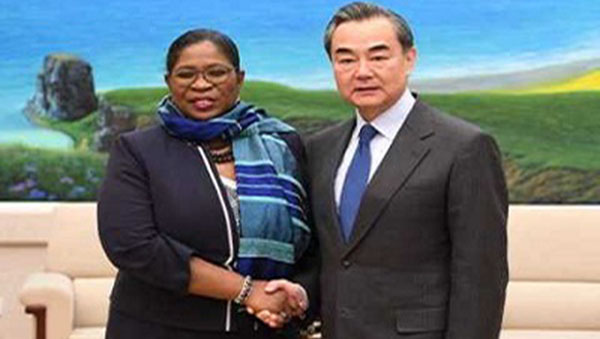SANTIAGO, Chile, January 24, 2017 (CMC) – Caribbean Community (CARICOM) countries have indicated a willingness to work with China, regarding the socio-economic development of the 15-member grouping.
Foreign Ministers of the nine CARICOM countries, which recognise Beijing, met with their Chinese counterpart, Wang Yi, on the side-lines of the Second Ministerial Meeting of the Community of Latin America and Caribbean States (CELAC) that ended here, on Monday.
Chair of the Council for Foreign and Community Relations (COFCOR) Maxine McClean, underscored the importance CARICOM attached to the existing Caribbean-China Economic and Trade Cooperation Forum, and the Caribbean-China Consultations.
McClean, who is also the Barbados Foreign Affairs and Foreign Trade Minister, described those consultations as “valuable mechanisms for continued dialogue and cooperation”.
She said CARICOM also regards the “One Belt, One Road” initiative China announced in Santiago, as a “very important cooperation and development mechanism”.
“We look forward to working, closely, with China in ascertaining the best means of linking the opportunities arising from the initiative to the Community’s own development goals and priorities. These include, for example, regional transportation, renewable energy, and strengthening our disaster management capacity,” the COFCOR Chair stated.
She said CARICOM also attaches importance to the CELAC-China Forum and believes a number of projects could redound to the benefit of all members of the Community from the Action Plan for 2019-2021.
Noting that sustainable development within CARICOM was challenged by peculiar exposures and vulnerabilities, unique to Small Island Developing States, McClean said there was need for a “new paradigm in development finance”, adding that this is critical for CARICOM to realise its economic and social development aspirations.
“We need the international financial architecture revised, urgently, to take into consideration the developmental peculiarities and vulnerabilities of SIDS,” she said, adding that CARICOM countries’ ability to rebound from the ravages of natural disasters is impaired by the graduation of some of its economies from access to concessionary development finance, due to the use of per capita income as the primary eligibility criterion and non-incorporation of their peculiar vulnerabilities.
“Concessional development funding is essential for the building of economic and climate resilience to serve as the platform for our sustainable development,” she said, urging the Chinese Foreign Minister to relay CARICOM’s concerns to his colleagues of the G20 and to the heads of international financial institutions.
She said that the region had also benefitted from China’s generous grant funding in the past and hoped that consideration would “continue to be given to this valuable means of development support”.
During the meeting, McClean expressed CARICOM’s appreciation to China for demonstrating its understanding of the region’s unique challenges, by generously donating US$30 million at the High-Level Pledging Conference, which CARICOM and the United Nations hosted in New York in November 2017.
The Chinese Foreign Minister in his remarks noted that the achievements of Caribbean-China cooperation is evident in infrastructural developments, including roads and hospitals, visa waiver agreements that facilitate increased Chinese tourist arrivals to the region; conclusion of extradition treaties; an increased number of Confucius Institutes, as well as capacity building for CARICOM nationals through training workshops and scholarships.
He also spoke of the people-to-people exchanges.
A CARICOM Secretariat statement, issued yesterday, noted that the presentations by CARICOM foreign ministers underlined the importance of meaningful and transformative projects for all CARICOM member states.
It said that they also highlighted the importance of grant, as well as concessional, funding to underwrite selected projects.
“Yi noted the CARICOM’s development challenges as well as the comments, proposals and cooperation interests put forward. He expressed China’s willingness to support issues such as climate change and disaster relief, and to deepen bilateral cooperation in a wide range of areas,” the statement said.
It quoted him as urging the submission of projects, and that “specific needs should be put forward through the various Chinese Embassies”.
The Chinese foreign minister said that the Belt and Road Initiative was “a new proposal for economic cooperation that had been warmly received and recognised by over 100 countries and had become a most popular public good”.
Latin America and the Caribbean should not be left out, Yi noted, adding that apart from the availability of financial resources, participation in the cooperation initiative provides access to the huge Chinese market. To this end, he said China is organising an “import fair” later this year.
“In addition to the cooperation opportunities arising from the CELAC-China Forum, CARICOM and China affirmed their commitment to strengthen existing CARICOM-China cooperation mechanisms, including the Caribbean-China Economic and Trade Forum, the Caribbean-China Consultations process and to a new mechanism, a standing meeting in the margins of the U.N. General Assembly,” the statement added.
 Pride News Canada's Leader In African Canadian & Caribbean News, Views & Lifestyle
Pride News Canada's Leader In African Canadian & Caribbean News, Views & Lifestyle





